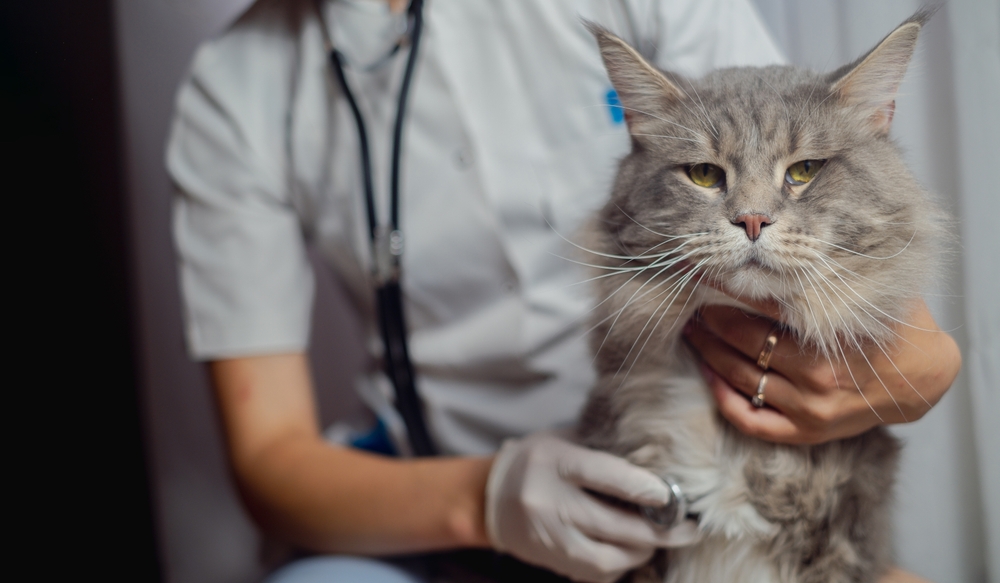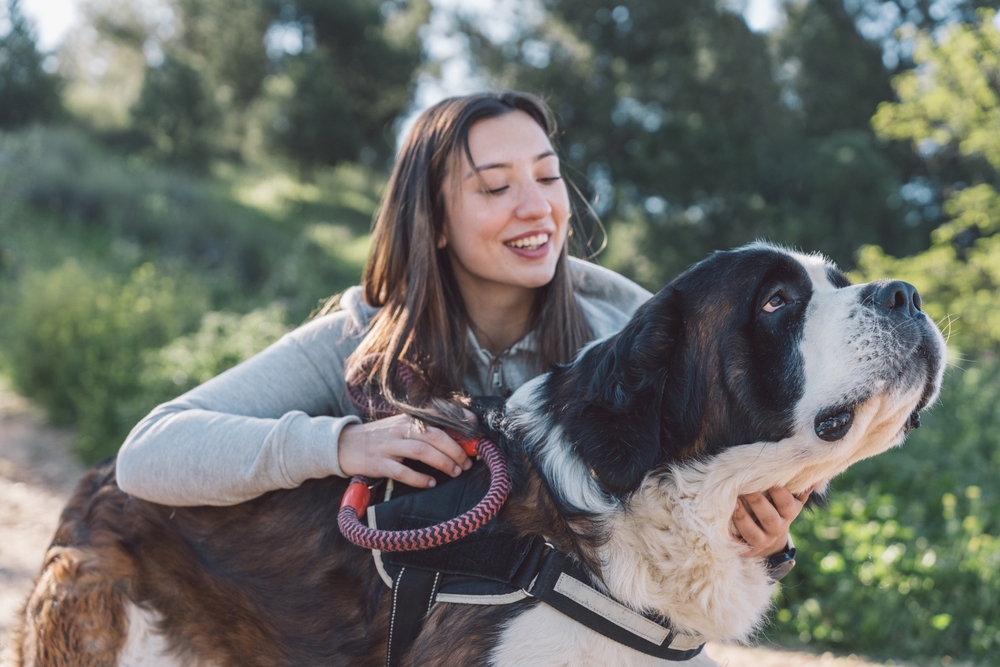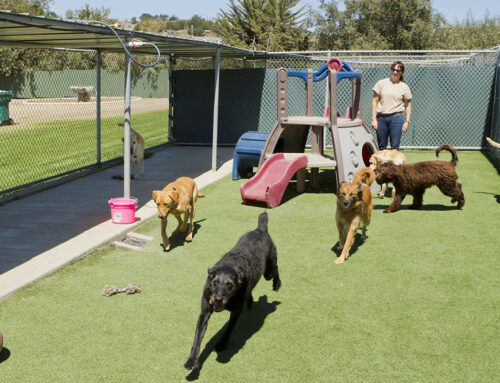Over centuries, pets have been selectively bred to exhibit specific physical and behavioral traits such as long ears, short legs, or a particular coat color. While this has resulted in many beloved breeds, certain health issue predispositions have emerged. Understanding common breed-related health problems is crucial for pet owners to recognize, manage, and prevent. Our Memorial Villages Animal Hospital team explains why you need to be aware of pet breed-related health issues and describes the most prevalent issues in specific breeds. By staying informed about your pet’s breed-related problems, you play a proactive role in maintaining your furry companion’s health and well-being.
Breathing difficulties in pets
Brachycephalic breeds are characterized by their short, broad skulls and flattened faces—characteristics that make them exceedingly cute. Brachycephalic dog breeds include bulldogs, pugs, French bulldogs, and Boston terriers. Brachycephalic cat breeds include Persians and Himalayans. While these cuties are endearing, their skull conformation can lead to breathing difficulties because of how their airways are structured. The shortened airways and other anatomical features can result in respiratory problems, making breathing more difficult for brachycephalic breeds than for pets with longer muzzles.
Brachycephalic pets’ skull conformation and related problems can lead to snorting and snoring and, in severe cases, cause overheating during warm weather or exercise. If you have a brachycephalic breed, you can help manage your pet’s potential respiratory problems by:
- Keeping your pet at a healthy weight to reduce their respiratory strain.
- Providing a cool and well-ventilated environment, especially during warm weather.
- Avoiding strenuous exercise and limiting activity during hot or humid weather.
- Outfitting your pet in a harness rather than a collar for walks, which reduces pressure on their throat.
Hip dysplasia in pets
Hip dysplasia is a prevalent genetic skeletal disorder that affects pets’ hip joints. The issue arises from a misalignment between the joint’s ball and socket, leading to abnormal wear and tear. The ensuing discomfort and lameness in affected pets may necessitate medical or surgical intervention for relief.
Large-breed dogs such as German shepherd dogs, Labrador and golden retrievers are prone to hip dysplasia. Cat breeds predisposed to hip dysplasia include Maine coon and Norwegian forest cats. To help prevent and manage this condition, follow these tips:
- Feed your pet a balanced diet — A well-balanced diet that includes appropriate nutrients supports a pet’s overall joint health. Incorporating joint-friendly supplements, such as glucosamine and chondroitin, may also be beneficial.
- Maintain your pet at a healthy weight — Keeping your pet at an optimal body weight is crucial for reducing stress on their hip joints. Overweight or obese cats and dogs have a high hip dysplasia risk, so ensure you monitor your pet’s food intake and encourage regular exercise.
- Ensure your pet exercises moderately — Discourage your pet from performing high-impact exercises to prevent exacerbating hip dysplasia signs. Ensure your pet’s exercises are low-impact, such as swimming and leash walking, to promote muscle strength and joint flexibility while minimizing hip joint strain.
Dental issues in pets
Some pet breeds, such as Siamese cats and English bulldogs, are predisposed to dental problems. These breeds’ genetics also predispose them to severe dental issues such as periodontal disease, odontoclastic resorptive lesions (ORLs), and gingivostomatitis. Their distinct jaw structure can cause teeth misalignment, which contributes to dental problems.
If you have a pet whose breed predisposes them to severe dental issues, you must prioritize their oral health by providing regular dental care and professional checkups to maintain healthy teeth and gums. Regular dental care should include:
- Brushing your pet’s teeth daily with a pet-specific toothbrush and toothpaste to prevent plaque and tartar buildup.
- Dental treats or toys should be provided to promote oral hygiene and reduce plaque and tartar.
- Regular professional dental checkups to monitor your pet’s oral health and address any issues early.
- Feeding your pet a balanced diet and avoiding excessive treats.
Intervertebral disc disease in pets
Dachshunds are infamous for their long backs and short legs, which predisposes them to back issues. Certain cat breeds, such as Persians, Siamese, and Himalyans, are also prone to spinal problems. These pets’ unique physique makes them especially susceptible to intervertebral disc disease (IVDD). IVDD occurs when the cushioning discs between the spinal vertebrae bulge or burst into the spinal cord space, causing pain, nerve damage, and, in severe cases, paralysis. Various factors, including genetics, obesity, and physical trauma, can trigger this condition.
If your pet’s breed is predisposed to IVDD, you must prevent them from doing activities that strain the back, such as jumping from heights, or twisting or turning the spine. By keeping your pet at a healthy weight through a balanced diet and regular exercise, you also help reduce their IVDD risk. Additionally, providing ramps or stairs to help these pet breeds climb up to a comfy sofa or chair are essential preventive measures.
If you notice any back pain or neurologic signs in your pet, such as reluctance to move, yelping when touched, or dragging the hind legs, seek prompt veterinary care. Early detection and appropriate treatment can significantly improve the prognosis for pets with back issues.
Hypertrophic cardiomyopathy in pets

Certain cat and dog breeds are predisposed to hypertrophic cardiomyopathy (HCM), which is an abnormal thickening of the heart muscle. HCM can significantly impede the heart’s ability to pump blood effectively. Doberman pinschers, boxers, Great Danes, and especially Maine coon cats are genetically predisposed to HCM. If your pet’s breed is prone to HCM, you must be proactive in managing their cardiac health. Regular cardiac screenings and early detection lab work are essential for effectively managing this condition.
Understanding common breed-related health problems is essential for every pet owner. Awareness of the specific health issues to which certain breeds are prone allows you to focus on proactive steps to help ensure your pet’s well-being. No matter your pet’s breed, your role in identifying any health issues is essential, as early disease detection means timely treatment, less severe disease, and an improved quality of life. If you are concerned about the health issues to which your pet’s breed is genetically predisposed, contact our Memorial Villages Animal Hospital team.









Leave A Comment